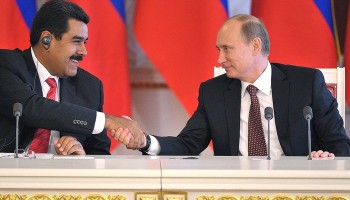Alex Saab, a Colombian businessman, allegedly ran a complicated network of shell companies that laundered money earned from overvalued government contracts meant for food subsidies, according to the Department of Treasury’s sanctions announcement. In total, 10 people were sanctioned and 13 businesses were blocked by the US Department of Treasury.
“Alex Saab engaged with Maduro insiders to run a wide-scale corruption network they callously used to exploit Venezuela’s starving population,” US Secretary of Treasury, Steven Mnuchin, said. “They use food as a form of social control, to reward political supporters and punish opponents, all the while pocketing hundreds of millions of dollars through a number of fraudulent schemes.”
The Department of Treasury alleges Saab worked with Maduro's three stepsons, Walter, Yosser and Yoswal, also known as Los Chamos, slang for “the kids,” to gain access to government officials so he could secure government contracts through bribes. The three in return were rewarded with kickbacks.
Saab began his long tango with the Venezuelan government in 2009 when he and business partner Alvero Pulido won an overvalued government contract to build 25,000 units of low-income housing for three or four-times the worth of the original construction cost.
The Colombian met ‘Los Chamos’ in 2011 and because of their direct access to Maduro and former Vice President Tareck El Aissami, the brothers manipulated government contracts so Saab could profit and maintain ties with the upper echelon of the Venezuelan government, according to the Department of Treasury.
By the time the food crisis was in full swing in 2016, Saab and Pulido were awarded a government contract under the Local Committees for Supply and Production, or CLAP program, to import food to the starving population. But Saab and Pulido used the shell companies to import a fraction of food ration boxes and reaped huge profits from the scheme.
The government would prepay each shell company and the masterminds would collect a kickback fund to bribe government officials in on the corruption plan, according to the Department of Treasury. Then to further launder the money, a portion would be sent to businesses with no connection to food distribution. By using the outside business accounts, more of the stolen money would be sent to political figures, their families or associates.
Additionally, CLAP companies would send fake invoices for food purchased worth the amount specified in the overvalued contract, the Department of Treasury states.
Since the scheme was so profitable, in 2018 the Venezuelan government began to use gold resources to pay for CLAP and other government contracts. According to the report, “the Government of Venezuela pressured miners to sell gold to Saab at an inflated official market rate, instead of on the black market.”
The gold would be flown to the United Arab Emirates and Turkey. Saab’s company, Mulberry, based in Turkey, allegedly would help facilitate payments for the selling of gold and goods back to Venezuelan clients.
The gold industry has been sanctioned by the United States government since November 2018.
Between 2015 and 2016, the Venezuelan people reported they lost an average of 19 pounds because of the food crisis, according to Vox. Hyperinflation has devastated the country since the 2014 economic collapse when global oil prices fell.
As of March 2019, the US has placed financial sanctions on 85 Venezuelans, including President Maduro, his wife and other political figures.






